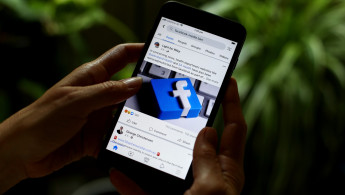Outrage as Facebook removes Palestinian pages covering news from Jerusalem
Facebook is “actively fighting Palestinian content” the editors of Palestinian news pages that were removed by the social media giant earlier this week have said.
The two Palestinian news pages, Al-Qastal and Maydan Al-Quds, disappeared from Facebook after the company removed them for ‘violating the community standards’. Facebook’s move came only a month after it opened a special investigation on Palestine-Israel content suppression.
The two Palestinian pages reported daily news in Jerusalem from a Palestinian perspective, focusing on Israeli violations against Palestinians in the city.
Facebook's move followed the removal of several of the pages' posts, related to Sunday’s attack in Jerusalem, where a Palestinian gunman belonging to Hamas opened fire at Israelis, killing one and injuring at least three, before being killed himself.
This week, Facebook blocked the accounts of leading media outlets AlQastal
— Shimaa (@shimaafaris456) November 25, 2021
and Maidan AlQuds along with dozens of other accounts of Palestinian
activists. #FBCensorsJerusalem pic.twitter.com/YmsAINbMj8
Late on Wednesday, online activists took part in a livestream on Twitter, as part of a wider online campaign to protest Facebook’s “suppression of Palestinian content”. In the livestream Juman Abu Arafah, the editor of Maydan Al-Quds, one of the pages removed by Facebook, said that “the removal of the page is a big loss, since it had reached 1.2 million followers, and even though we continue publishing on other platforms, most of the Palestinian audience follows Facebook”.
"What are we supposed to publish then?"
According to Abu Arafah, censorship of Maydan Al-Quds’s page had been going on systematically for a long time before it was removed.
“One time our reporter went to the house of a detainee in Sheikh Jarrah to meet his mother” she noted, “we announced that the interview will be livestreamed, and right before the livestream began, it was censored.”
Abu Arafah pointed out that “censorship also happens on Instagram, and it can be for a simple picture, like the one we published of Fadi Abu Shukheidem, the Palestinian who was killed after opening fire in Jerusalem on Sunday, although it was only an informative picture”.
Abu Arafah noted that the last material removed by Facebook before it shut down the page was a video interview of a student at the school where Abu Shukheidem worked as teacher.
The student described him as “a good teacher”, and the video was removed with a warning sent to the page. “How does a testimony from a school boy about his late teacher break Facebook’s standards?” she exclaimed, “What are we supposed to publish then?”
Facebook has shut down two of the most prominent news agencies reporting from Jerusalem on the ground. #FbCensorsJerusalem
— Mohammed El-Kurd (@m7mdkurd) November 24, 2021
Anti-Arab content allowed, Anti-Israel content censored
According to Eyad Refai, the director of Sada Social Center for the Defence of Palestinian Digital Rights, “Every time we contact Facebook for Palestinian content suppresion, the company replies that censorship happens because of the algorithms, not because of human intervention”.
Refai, who also spoke at the livestream, underlined that “the algorithms are made by the company. They implement the company’s policy, and they are discriminatory”.
According to Refai, “Facebook gives much of a space to Hebrew language Israeli pages, much of which contain anti-Palestinian hate speech, incitement to violence against Arabs and racist language, and it’s rarely censored”.
Refai revealed that last May, during a wave of protest in Jerusalem and the West Bank, Sada Social Centre conducted an experiment.
“We published a post in Arabic that said 'Death to Israel' and another one in Hebrew that said 'Death to the Arabs'. The first one was removed immediately, while the second is still online."
The director of the Arab center for Social Media Advancement - 7amleh, told The New Arab earlier in October that Arab, Muslim and Palestinian content on Facebook is "over moderated", leading to discirmination in content removal.
Refai added that Sada Social Centre has met with Facebook staff and discussed the removal of Al-Qastal and Maydan al-Quds. "The company staff have promised to review the decision", he added.
Facebook came under criticism in October after The Intercept published a leaked list of names that Facebook used to censor content, containing hundreds of names of Palestinian figures and organizations.





 Follow the Middle East's top stories in English at The New Arab on Google News
Follow the Middle East's top stories in English at The New Arab on Google News


